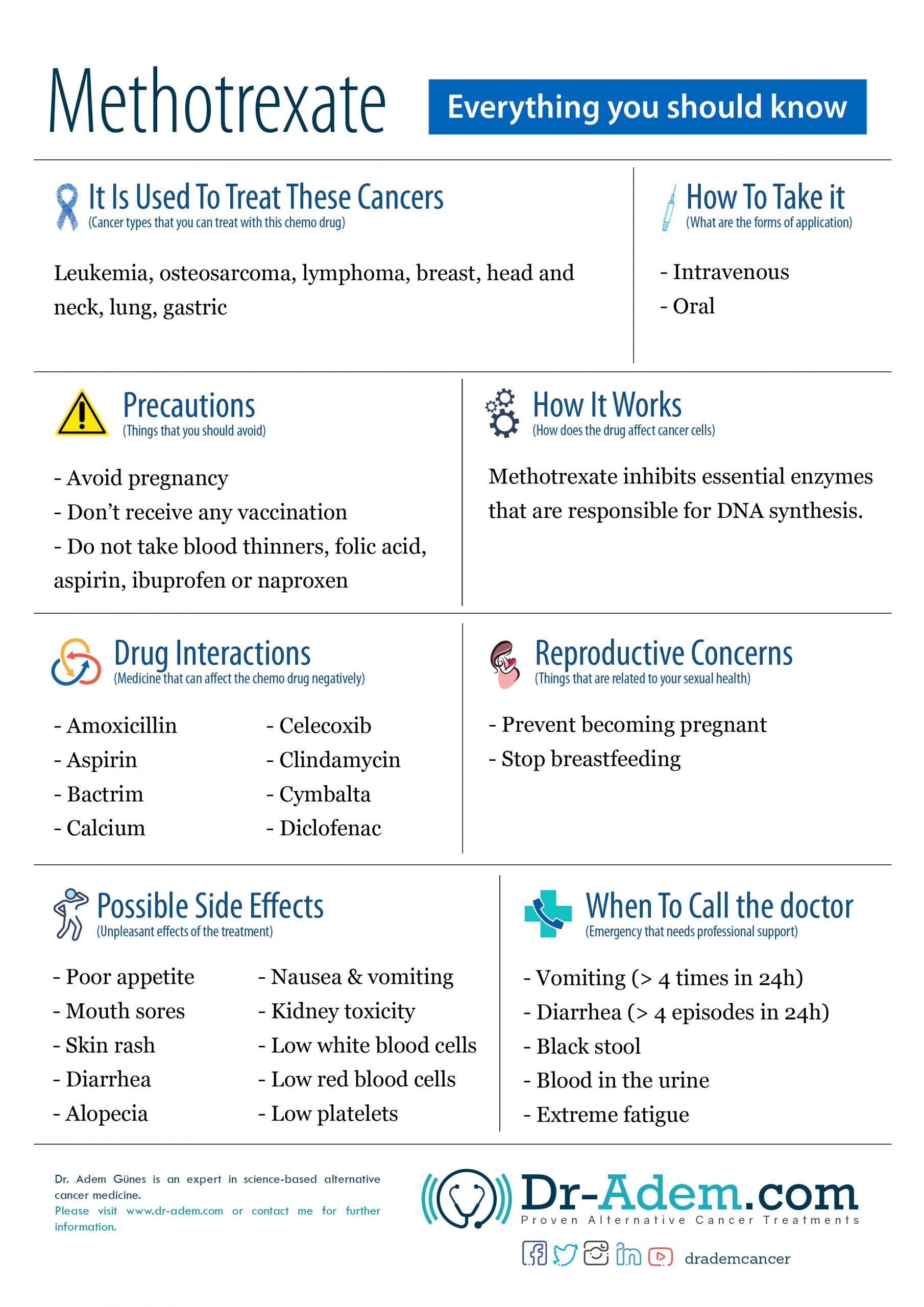Fact Sheet – Everything You Should Know
In this Methotrexate fact sheet, you’ll get to know about the precautions, usage, possible side effects, and the types of cancer that you can treat with this chemo drug.

Embed this Infographic on your site:
<a href='https://dr-adem.com/methotrexate-fact-sheet/'><img src='https://dr-adem.com/wp-content/uploads/2019/11/Methotrexate2-scaled.jpg' alt='Methotrexate Fact Sheet'/></a>Here’s the Methotrexate fact sheet to get detailed information about Methotrexate
It Is Used To Treat These Cancers
(Cancer types that you can treat with this chemo drug)
- Leukemia
- Osteosarcoma
- Lymphoma
- Breast
- Head and neck
- Lung
- Gastric
How To Take it
(What are the forms of application)
- Intravenous
- Intramuscular
- Oral
- Intrathecal (inside the spinal fluid)
Precautions
(Things that you should avoid)
- Avoid pregnancy
- Don’t receive any vaccination
- Do not take blood thinners, folic acid, aspirin, ibuprofen or naproxen
- When taken in intermediary or high doses, must be given with folic acid
- When taken in high doses can cause precipitation inside the kidney tubules: plenty of hydration, urine alkalinization, and close kidney function monitoring
Mechanism of Action of Methotrexate
(How does the drug affect cancer cells)
Methotrexate is an antimetabolite (folic acid antagonist subgroup). It inhibits the function of a specific enzyme, which is responsible for the production of the purine nucleotides (building blocks for the DNA strands), causing cellular death.
Drug Interactions
(Medicine that can affect the chemo drug negatively)
- Amoxicillin
- Aspirin
- Bactrim
- Calcium
- Celecoxib
- Clindamycin
- Cymbalta
- Diclofenac
Reproductive Concerns
(Things that are related to your sexual health)
- Pregnancy prevention during and until 6 months after the treatment (men and women)
- Stop breastfeeding
- Consider sperm freezing if willing to bear children
Possible Side Effects
(Unpleasant effects of the treatment)
- Loss of appetite
- Urine can become green/blue up to 2 days after the infusion (no kidney damage associated)
- Mouth ulcers
- Skin rash
- Diarrhea
- Alopecia
- Nausea & vomiting
- Kidney toxicity
- Low white blood cells: raise the risk of bacterial infection
- Low red blood cells: can lead to fatigue, general lack of interest and drive to be active
- Low platelets: can lead to bleeding (nose, gums) and in extreme cases to internal bleeding (intestinal, brain, joints)
- Infertility
When To Call the doctor
(Emergency that needs professional support)
- Vomiting (>4 times in 24h): can lead to severe dehydration and electrolyte disbalance
- Diarrhea (>4 episodes in 24h): can also lead to severe dehydration and electrolyte disbalance
- Black stool: can be a sign of intestinal bleeding
- Blood in the urine
- Extreme fatigue: can be a sign of severe anemia (low blood cells)
- Fever > 37,8°C


